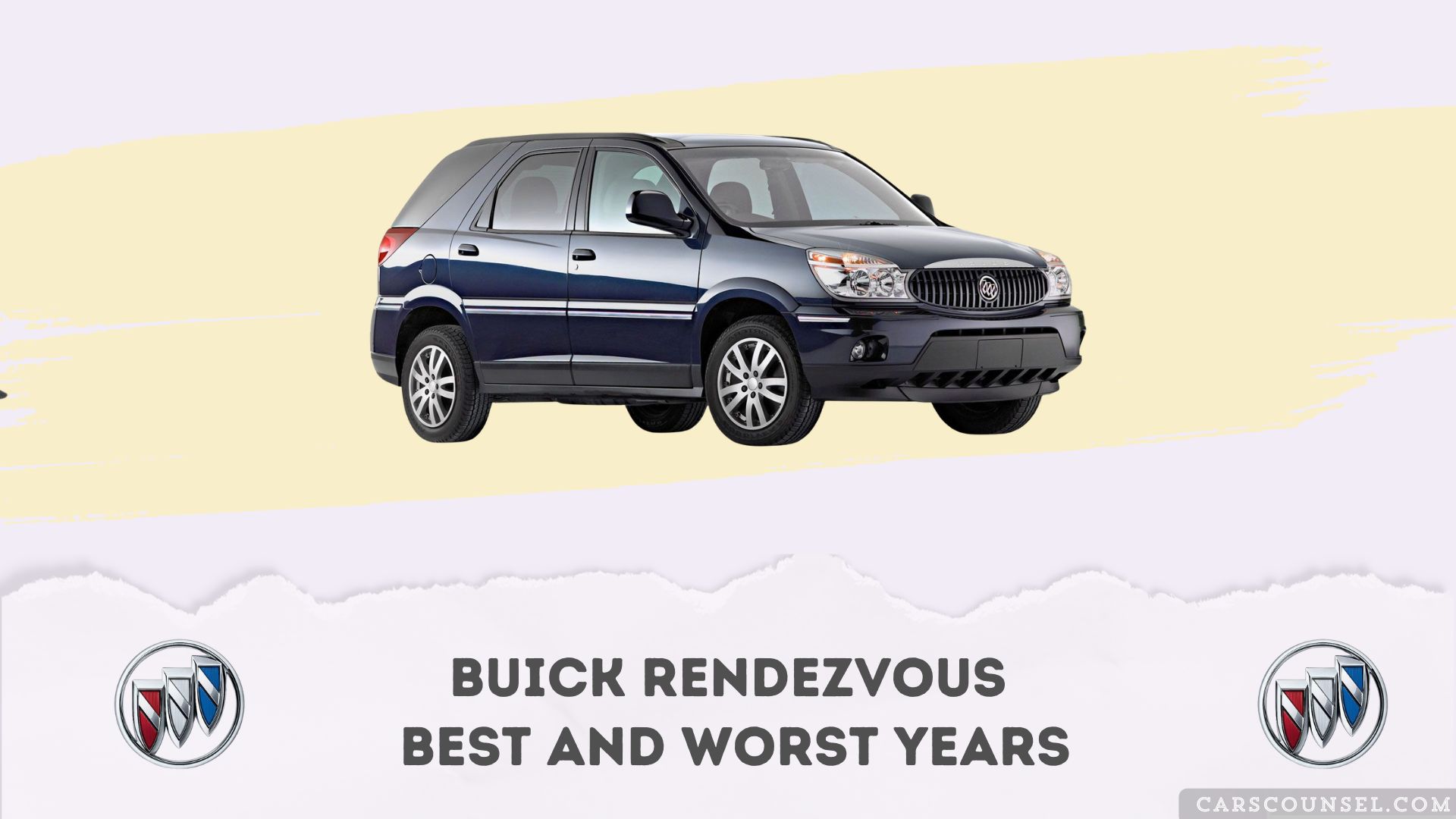As you venture into the world of used SUVs, you might find yourself echoing the sentiments of Robert Frost, “two roads forked in a yellow wood.” Regarding the Buick Rendezvous, choosing the right model year can make all the difference.
While some years shine with reliability and performance, others are plagued by issues that can leave you stranded.
So, which path will you take? Will you opt for the 2007 model, hailed as a “best” by J.D. Power, or will you risk it with a problematic year like 2005?

Quick Navigation
Key Takeaways
- The 2007 Buick Rendezvous is considered the best year, with a reliability score of 85 out of 100 from J.D. Power.
- Avoid the 2005 model year due to reliability issues and higher repair costs.
- The 2002-2003 models are prone to transmission problems, so owners should stay vigilant and address any issues promptly.
- The 2007 Rendezvous CX is a good choice, with a good consumer rating and low depreciation rate.
- Research the vehicle’s history and maintenance records, and have it inspected by a mechanic before purchasing.
Rendezvous Reliability and Ratings
When researching the Buick Rendezvous, reliability and ratings are essential elements to ponder.
You’ll be pleased to know that the Rendezvous has a 3.8 out of 5.0 consumer rating from RepairPal and an average score of 4.4 out of 5.0 from Cars.com.
The 2007 model year stands out, with a reliability score of 85 out of 100 from J.D. Power, earning it a “best” rating.
Additionally, the 3.5L engine is considered one of the best from GM.
With a total annual repair cost of approximately $430, which is lower than the average for midsize SUVs, you can expect a reliable ride with minimal repair costs.
Common Problems to Watch Out For
When buying a used Buick Rendezvous, you’ll want to watch out for common problems that can lead to costly repairs.
Transmission troubles, engine issues, and fuel system faults are prevalent in these models, and can cause a range of problems from erratic shifting to engine overheating.
Transmission Troubles
What’s causing your Buick Rendezvous to hesitate or slam into gear?
If you’re experiencing erratic shifting or slamming into gear, it could be a sign of a faulty transmission pressure control solenoid. This issue is common in 2002-2005 models, which often have problems with slipping or hesitation when shifting gears.
A faulty solenoid can cause the transmission to get stuck between gears, leading to jerking, popping, and loud noises. Ignoring transmission troubles can lead to costly repairs, with some owners reporting costs over $1,000.
Replacing the transmission seal may be necessary, which can be a time-consuming and expensive repair.
Engine Issues Found
Your Buick Rendezvous’s engine may be experiencing issues that can leave you stranded on the side of the road or dealing with costly repairs. One common problem is engine power loss, which can be caused by a faulty intake manifold gasket.
This can lead to engine damage and trigger the check engine light. Another issue is engine oil leaks, which can cause significant engine damage if left unchecked.
| Engine Issue | Symptoms | Solution |
|---|---|---|
| Intake Manifold Gasket Failure | Loss of engine power, rough idling | Replace intake manifold gasket |
| Engine Oil Leaks | Oil spots under the vehicle, low oil levels | Replace engine oil seals/gaskets |
| Faulty V6 Engine Sensors | Check engine light, poor engine performance | Replace faulty sensors, reprogram engine computer |
Fuel System Faults
As you drive your Buick Rendezvous, faulty fuel system components can quietly wreak havoc on your vehicle’s performance, eventually leading to costly repairs or even breakdowns.
Faulty fuel tank sensors can cause inaccurate Fuel Gauge readings, leading to fuel economy issues. A loose or damaged gas cap can trigger “check engine” lights and decrease fuel efficiency.
Electrical issues can also affect the fuel system, causing poor engine performance and decreased fuel economy. Be on the lookout for these common fuel system faults to avoid costly repairs and guarantee your Buick Rendezvous runs smoothly.
Transmission Issues and Repair
The Buick Rendezvous’s transmission system is a complex network of components that work together to provide smooth gear shifts and ideal engine performance.
However, if you’re experiencing erratic shifting or slamming into gear, it may be due to a faulty transmission pressure control solenoid.
Transmission problems in your Rendezvous can lead to costly repairs if left unaddressed, with some transmission repairs costing upwards of $1,500 to $3,000.
You may notice slipping, hesitation, or complete failure, especially in the 2002-2007 models.
Regular transmission fluid and filter replacements can help prevent these issues.
Engine Problems and Solutions
Engine problems can be a major headache for Buick Rendezvous owners, and it’s essential to address them promptly to prevent costly repairs down the line.
You may experience issues like intake manifold gasket failure, which can cause overheating, coolant leaks, and even engine fires.
The 3.6L engine is prone to timing chain and guide failure, leading to costly repairs if left unaddressed.
Leaking intake manifold gaskets can mix coolant with engine oil, causing severe engine damage.
Replace the gasket for $25-$100 plus labor costs to prevent this.
Regularly replacing the engine air filter and spark plugs can also help prevent engine problems.
Fuel System Failures and Fixes
Fuel system failures can leave you stranded, and it’s crucial to identify the issues promptly to avoid costly repairs or even safety risks.
If your Buick Rendezvous’s fuel system malfunctions, you may notice a decrease in power or a warning light on your dashboard. Faulty fuel injectors, clogged fuel filters, or electrical system issues can cause these problems.
Additionally, a malfunctioning cooling system can lead to overheating, which can damage your fuel system.
To fix these issues, you’ll need to diagnose the root cause and replace the faulty components. Be sure to consult your owner’s manual or a professional mechanic for guidance.
Other Common Issues to Be Aware Of
As you research the Buick Rendezvous, you’ll want to be aware of some additional common problems that can arise.
Rust in the rear wheel arches, issues with the PK3 anti-theft system, and water leaks inside the vehicle are all potential concerns you should know about. These problems can cause a range of issues, from flashing security lights to no-start conditions, and can be costly to repair if left unchecked.
Transmission Slipping Issues
When driving your Buick Rendezvous, you might experience transmission slipping issues, which can be frustrating and unsettling.
This problem is often caused by a faulty transmission pressure control solenoid, leading to erratic shifting, jerking, and loud noises. Replacing the solenoid may require partial disassembly of the transmission, a costly and time-consuming repair.
Regularly replacing the transmission fluid and filter can help prevent these issues, but addressing problems promptly is vital to avoid further damage.
Be aware that 2002 and 2003 models are particularly prone to transmission problems, so stay vigilant and address any issues promptly.
Fuel System Failures
Your Buick Rendezvous’s fuel system is a complex network of components that can fail, leading to poor engine performance, decreased fuel efficiency, and even engine stalling.
You may notice issues like a flashing “Check Engine” light or a Red Light on your dashboard.
If you’re experiencing fuel system failures, here are some common problems to look out for:
- Faulty Fuel Pressure Sensor: A malfunctioning sensor can cause your engine to stall or hesitate.
- Clogged Fuel Filter: A dirty filter can restrict fuel flow, leading to poor engine performance.
- Faulty Fuel Pump: A failing fuel pump can cause your engine to stall or not start at all.
- Leaks in the Fuel System: Leaks can cause fuel to evaporate, triggering the CX security light on your dashboard.
Model History and Features to Consider
The Buick Rendezvous’s production run spanned nearly a decade, with the model undergoing significant changes throughout its lifespan. As you consider purchasing a used Rendezvous, it’s essential to understand its history and features. The crossover SUV was offered in various trim levels, including the CX and CXL, with the latter featuring advanced amenities like power steering and rear parking assist.
| Model Year | Engine Options |
|---|---|
| 2004 | 3.4L LA1 V6, 3.5L LX9 V6, High Feature LY7 3.6L V6 |
| 2007 | 3.5L LX9 V6 (CX), High Feature LY7 3.6L V6 (CXL) |
| 2007 | Standard CX features: 17-inch wheels, keyless entry, power windows, rear parking assist |
| 2007 | CXL trim adds: leather seats, heated mirrors, and a premium audio system |
Buying a Used Rendezvous: What to Know
Purchasing a used Buick Rendezvous requires careful consideration to guarantee you’re getting a reliable vehicle.
Research the vehicle’s history and maintenance records before purchasing, and have the vehicle inspected by a mechanic to identify potential problems.
Consider the following:
- Check the model year: Avoid the 2005 model, which has a reputation for being less reliable, and opt for a 2007 Rendezvous CX, which has a good consumer rating and low depreciation rate.
- Review maintenance records: Verify regular maintenance has been performed, including oil and filter changes, to prevent costly repairs.
- Test the features: Check if the automatic dual-zone climate control and navigation system are functioning properly.
- Get a fair price: Negotiate a reasonable price based on the vehicle’s age, condition, and potential repair costs.
When looking at performance cars, make sure to check out our guides on models like the Buick verano, Buick Envision, Buick Enclave and Buick Encore. Knowing which model years to target and which to avoid is crucial. Our expert reviews break down these models, providing insights into the years that are celebrated for their engineering excellence and driving satisfaction, as well as those that are best to avoid due to potential issues.

